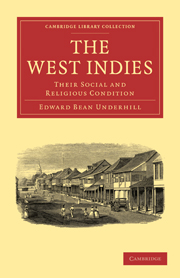Summary
The village of Moneague lies on the northern side of the mountains, which, running from east to west, divide the island into two well-defined sections. It is the centre of considerable traffic; has its stores, blacksmith's shop, a very comfortable hotel, and a market on the Saturday of every week. This is held in an open space in the centre of the village.
After breakfast we took a stroll among the people, threading our way among the yams spread out for sale upon the ground, inspecting the fruit, and asking questions. Besides abundance of bread-kind, we found exposed for sale—coffee, sugar in the wet state, the molasses not drained away, bread, beef, salt and fresh, salt fish, all in considerable quantities. Two or three Madras women, clad in their native costume, and adorned with an array of silver armlets and anklets, had laid out for buyers, cotton thread, buttons, laces, and small articles of housewifery. The butchers, of whom there were four or five, and one baker, alone had stalls; the ground was the counter of the rest. A small basin-full of sugar, nearly two pounds in weight, was sold for threepence. The coffee, in a green state, was sold by measure, at sixpence a quart. Beef was sixpence a pound.
We chatted for some time with a baker, having a large board piled with good white bread before him, and whose story of his life was interesting.
- Type
- Chapter
- Information
- The West IndiesTheir Social and Religious Condition, pp. 277 - 306Publisher: Cambridge University PressPrint publication year: 2010First published in: 1862

